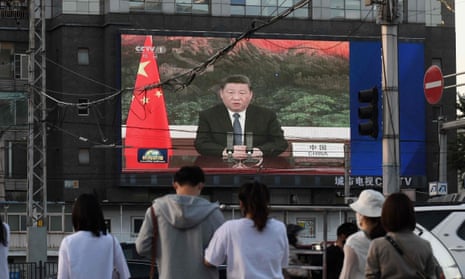China’s president, Xi Jinping, has said his country would support a “comprehensive review” of the Covid-19 pandemic after the outbreak has been brought under control.
Xi, speaking by video conference at the opening of the World Health Assembly, stressed that such an investigation must be conducted in an “objective and impartial manner” and said Beijing would donate $2bn to the United Nations to help the global response to the outbreak. “All along we have acted with openness, transparency and responsibility,” Xi said.
Diplomatic tensions were expected to dominate the WHA, the governing body of the World Health Organization, which began a two-day meeting on Monday. More than 120 countries have backed a draft resolution co-sponsored by the European Union and Australia calling for an inquiry into the origins of Covid-19. The resolution does not specifically name China, but countries such as the US have accused Beijing of suppressing information about the virus.
Beijing has criticised such calls as an attempt to shift blame or politicise a global health issue. Xi’s comments echo Beijing’s previous statements that the international community’s focus should be on cooperation and stopping the virus. In a media briefing on Monday, China’s foreign ministry spokesman Zhao Lijian described an investigation into the origins of the virus as “premature”.
China reacted furiously to Australia’s earlier call for an independent investigation, retaliating by reinvigorating months-old trade disputes. The Australian government has claimed the resolution as a victory despite suggestions from within its ranks that it had been “watered down”.
In a statement to the WHA, the Australian health minister, Greg Hunt, said he was pleased there was support for an “impartial, independent and comprehensive evaluation of the global response”.
The Covid-19 pandemic, which first emerged in Wuhan last December, has placed China under more scrutiny as critics call for an investigation into how the virus was able to spread across the world. It has now infected more than 4.7 million people and killed 315,000.
The resolution on Covid-19 will be put forward on Tuesday if it gains backing from two-thirds of the 194 members of the assembly.
“China’s reluctance to allow the international community to investigate and its enthusiasm in creating all sorts of conspiracy theories pointing to non-China origins of the virus only make the world more eager to know the answer,” said Ho-Fung Hung, a professor in political economy at Johns Hopkins University in the US, with a focus on China.
Allies of China such as Indonesia and Russia are among the countries demanding independent investigation, Hung noted. “Beijing will find it difficult to resist without risking further damage of its international image,” he said.
In the run-up to the conference, calls for Taiwan to be allowed to join the meeting, led by the US, also threatened to anger Beijing, which has blocked Taiwan from attending since 2016. Joseph Wu, Taiwan’s foreign minister, said his country had not been invited to this week’s meeting, adding that it had agreed to put the issue off until later this year.
Wu said on Monday, just before the meeting began, that, after suggestions from allies and “like-minded nations”, Taiwan would not pursue its WHO bid for now. He expressed “deep regret and strong dissatisfaction” that the WHO secretariat had “yielded to pressure from the Chinese government”.
A report in the official news agency Xinhua said on Sunday “the US and other countries” were “determined to discuss Taiwan-related proposals for only one purpose: to politicise health issues and achieve their own interests at the expense of kidnapping the the World Health Assembly and hurting global cooperation”.
An article in the official People’s Daily on Monday said: “Any attempt to use the WHO as a tool for geopolitical games is tantamount to a challenge to humankind’s right to health.” An editorial in the Global Times said: “A politicised appeal won’t be supported at the assembly … The US has messed up its Covid-19 fight but intends to shift the responsibility on to China. Such a plan is bound to backfire.”
As criticism of China has increased over the last few months, support of Taiwan, seen as having successfully managed the outbreak, has grown. Previous bids by Taiwan, which had non-voting observer status at the WHO for seven years until 2016, have not gained as much traction as this year’s.
“Beijing has failed to shape the narrative on Covid-19, pressed too hard diplomatically against countries critical of its response, and come off as prioritising its image and its own interests, including on Taiwan, over global health,” said Jessica Drun, a non-resident fellow at Project 2049, a thinktank focusing on security in the Asia Pacific region.
“In the past, Taiwan’s bids have not gained as much traction as it is currently, and I think that’s largely due to the example Taiwan is setting to the world on not only how to effectively combat the disease on the home front, but also in sharing best practices through informal channels with the international community,” Drun said.
Additional reporting by Lillian Yang
